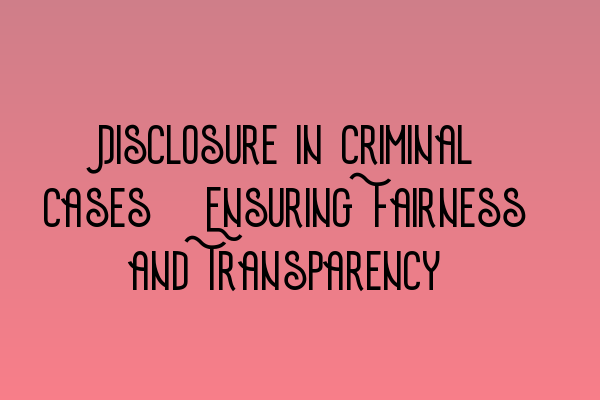Disclosure in Criminal Cases: Ensuring Fairness and Transparency
Disclosure is a fundamental aspect of criminal law cases that plays a crucial role in ensuring fairness and transparency throughout the legal process. It involves the exchange of information and evidence between the prosecution and the defence, allowing both sides to prepare their cases effectively.
Why is Disclosure Important?
Proper disclosure is essential to uphold the principles of justice in criminal cases. It allows the defence to have access to all relevant evidence held by the prosecution, enabling them to challenge the case properly and present a robust defence.
Without adequate disclosure, there is a risk that innocent individuals may be wrongly convicted, as crucial evidence may be withheld or overlooked. It is the duty of the prosecution to ensure that all relevant material, whether it supports the prosecution or the defence, is disclosed to achieve a fair trial.
The Challenges of Disclosure
Ensuring effective disclosure can be a complex and challenging process due to various factors, including the volume and complexity of the evidence, digital data, and the need to protect sensitive information.
In recent years, the digital revolution has caused a significant increase in the amount of electronic evidence involved in criminal cases. This poses unique challenges when it comes to disclosure, as electronic data can be vast and difficult to review comprehensively.
Furthermore, ensuring that sensitive information, such as the identity of witnesses or confidential sources, remains protected is of utmost importance. Balancing the disclosure obligations with the need to protect individuals involved in criminal cases is a crucial task for legal professionals.
Addressing Disclosure Challenges
To address the challenges associated with disclosure, it is important for legal professionals to stay updated with the relevant legislation, guidelines, and best practices. The Solicitors Qualifying Examination (SQE) offers comprehensive courses and exams that cover criminal law and practice, providing aspiring solicitors with the necessary knowledge and skills to navigate the complexities of disclosure.
To ensure effective disclosure, legal professionals must carefully review and analyze all evidence, identify any inconsistencies or weaknesses in the prosecution’s case, and pursue additional disclosure if required. This process requires attention to detail, critical thinking, and the ability to apply legal principles effectively.
Stay Prepared with SQE Criminal Law & Practice Courses
If you are aspiring to become a solicitor specializing in criminal law, it is crucial to prepare thoroughly for the SQE exams. FQPS offers SQE 1 and SQE 2 preparation courses designed to equip you with the knowledge and skills necessary to excel in your legal career.
For SQE 1 preparation, we provide practice exams and mocks to help you assess your knowledge and improve your understanding of the criminal law and practice topics. Take advantage of our SQE 1 Practice Exam Questions and SQE 1 Practice Mocks FLK1 FLK2 to boost your confidence.
For SQE 2 candidates, we offer comprehensive preparation courses that cover the practical skills required to succeed in criminal law cases. Our expert tutors will guide you through the intricacies of disclosure, evidence handling, and effective case preparation. Visit our SQE 2 Preparation Courses page to learn more.
Stay Informed with SQE Criminal Law & Practice Updates
As an aspiring solicitor, it is crucial to stay updated with the latest developments in criminal law and practice. FQPS provides regular updates on SQE exam dates, registration deadlines, and important announcements. Visit our SQE 1 Preparation Courses page to stay informed and plan your study schedule effectively.
Remember, proper disclosure is essential for ensuring fairness and transparency in criminal cases. By equipping yourself with the necessary knowledge and skills through the SQE Criminal Law & Practice courses, you will be well-prepared to navigate the challenges of disclosure and uphold justice in your future legal career.
